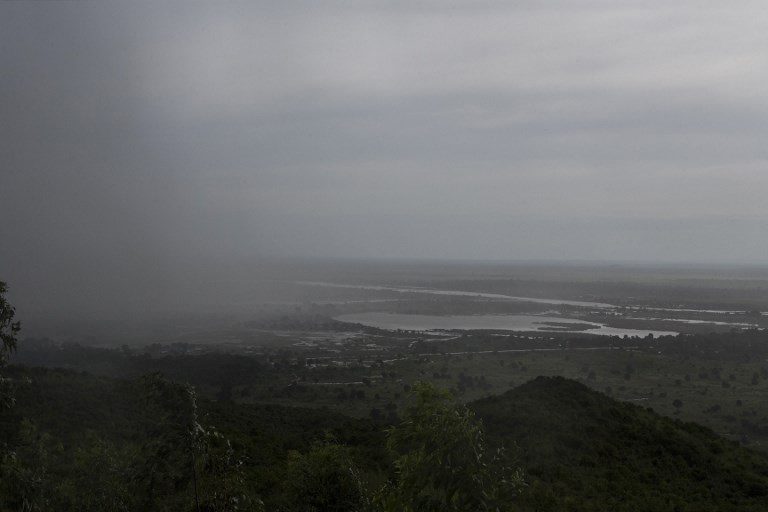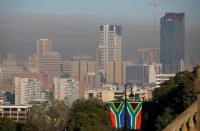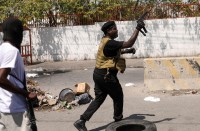
by Joaquim Nhamirre
Agence France Presse
MAPUTO, Mozambique (AFP) — Tropical cyclone Idai battered central Mozambique on Friday killing at least 19 people and cutting off more than half a million people in one of the country’s largest cities Beira.
State broadcaster Radio Mocambique, said “preliminary information points to 19 deaths and more than 70 injured in Sofala province as a result of cyclone Idai”.
Most of the deaths occurred in Beira — a port hub and capital of Sofala province — a city which has virtually been cut off after power lines crashed, the airport was shut and roads swamped by flooding.
The flooding had already killed 66 people nationwide in days preceding the cyclone.
“The hardest moment was overnight and this morning,” provincial governor Alberto Mondlane told state radio referring to the time the cyclone barrelled through the province.
“There has been a lot of damage. Many homes have been left without roofs,” he added.
An official at the National Institute of Disaster Management (NIDM) told AFP earlier that “houses and trees were destroyed and pylons downed”.
Authorities were forced to close Beira international airport after the air traffic control tower, the navigation systems and the runways were damaged by the storm.
“Unfortunately there is extreme havoc,” said the official.
“Some runway lights were damaged, the navigation system is damaged, the control tower antennas and the control tower itself are all damaged.
“The runway is full of obstacles and parked aircrafts are damaged.”
Late on Wednesday, the national carrier LAM cancelled all flights to Beira and Quelimane, which is also on the coast, as well as to Chomoio, which is inland.
Power utility Electricidade de Mocambique said in a statement that the provinces of Manica, Sofala and parts of Inhambane have been without power since Thursday.
Another official, Pedro Armando Alberto Virgula, in Chinde north of Beira, said a hospital, police station and seven schools there lost their roofs and several houses were destroyed.
Bonifacio Cebola, a spokesman for the Beira Central Hospital, said that the theatre at the country’s second largest hospital was not spared and surgeries have been suspended.
“Because of the cyclone, the (theatre) no longer has conditions for patients to be operated on,” Cebola said to Radio Moçambique.
Local officials said that this week’s heavy rains had already claimed 66 lives, injured 111 people and displaced 17,000 people.
The World Food Programme (WFP) said it would move 20 tonnes of emergency food aid to the affected areas.
The UN Office for the Coordination of Humanitarian Affairs (OCHA) had warned that the storm could pack winds of up to 190 kilometres per hour (118 miles per hour).
– ‘Devastation’ –
At least 126 people were killed by the downpour that has struck parts of Mozambique, Malawi and South Africa over the past week, officials said.
Heavy rains in neighbouring Malawi have affected almost a million people and claimed 56 lives, according to the latest government toll.
Authorities there have opened emergency relief camps where malaria and shortages of supplies have led to dire conditions, according to AFP correspondents.
Malawian President Peter Mutharika this week declared a natural disaster.
Mozambique’s weather service has warned that heavy rain will continue to batter Beira and surrounding areas until Sunday.
The UN warned of damage to crops, “including about 168,000 hectares (415,000 acres) of crops already impacted by flooding in early March, which will undermine food security and nutrition”.
Mozambique and Malawi, two of the poorest countries in the world, are prone to deadly flooding during the rainy season and chronic drought during the dry season.
In neighbouring Zimbabwe, weather services have warned that violent thunderstorms, lightning and strong winds will be experienced in the eastern regions of the country.







